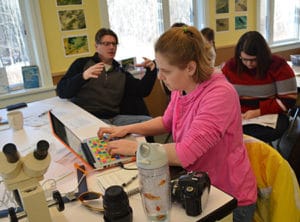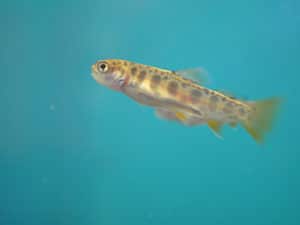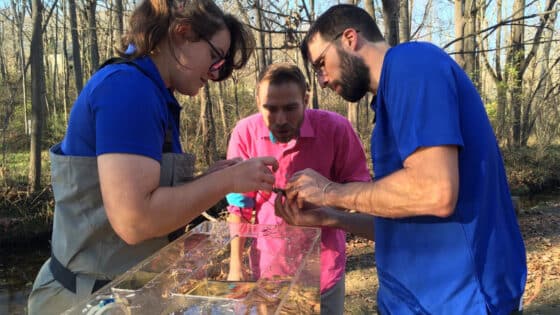Arscott and Colleagues Teach Next Generation of Freshwater Scientists

Almost 30 students at the University of Pennsylvania are learning about cutting-edge watershed science in Introduction to Freshwater Ecology, a recurring spring course organized and coordinated by Stroud Water Research Center Assistant Director Dave Arscott, Ph.D.
Many Stroud Center scientists contribute lectures throughout the semester, covering topics ranging from hydrology and fluvial geomorphology to chemistry, aquatic microbiology, and insect and fish ecology.
Students are also introduced to the impacts of human activities on watershed and stream ecosystems. Some of these impacts include:
- Stormwater runoff and its management.
- Point and nonpoint sources of pollution and their impacts.
- The influence of dams and water withdrawals on stream ecosystems and watershed restoration and management.
Enrollment consists of primarily junior and senior undergraduates studying biology or related disciplines and students in the College of Graduate Studies.
Would you like to learn more about watershed science? Join us at our upcoming events.
Stroud Center Spreads the Word About Trees for Clean Water
Stroud Center Director Bern Sweeney, Ph.D., and Watershed Restoration Manager David Wise both gave webinars as part of the Buffer Environmental Education Series, a joint effort of the U.S. Forest Service, the Alliance for the Chesapeake Bay, and the Farm Service Agency.
Sweeney’s webinar covered why streamside forests are critical to healthy streams and a healthy Chesapeake Bay. Wise co-presented with Katie Ombalski, a conservation biologist with Clear Water Conservancy. Their webinar covered lessons learned from both scientific research and tree-planting projects. They also offered guidance on improving the long-term success of riparian forest buffers and saving money doing it.
In January, Sweeney gave the keynote address at the Trees for Water Forum sponsored by American Rivers. The forum looked at assessing riparian buffer benefits for communities in Pennsylvania. Sweeney spoke about the use of science in determining the water-quality benefits of trees.
Education Programs Reach Students, Teachers, and Parents

Trout Grow on Trees remains a popular Stroud Water Research Center education program. On December 13, Tara Muenz, assistant director of education, led a Family Day at the Stroud Center.
Schoolchildren and their parents learned how trees along streambanks support brook trout populations and keep freshwater ecosystems healthy. They also enjoyed an unseasonably warm winter hike along White Clay Creek, saw live trout, and participated in fun activities like trout bingo and drawing. Thanks to volunteers Libby Gregg, Rebecca Duczkowski, Payton Shonk, Matt Wilson, and Jennie Matkov, the day was a huge hit!
The Leaf Pack Network enables students and teachers to learn about water quality by collecting stream ecology data using leaf packs and sharing their data online. Now the Stroud Center is connecting with groups across the nation and the world through video conferencing!

On January 14, Tara Muenz, the Leaf Pack Network administrator, teleconferenced with a sixth-grade class from Green Park Lutheran School in St. Louis, Missouri. The students shared their graphed data and peppered Muenz with questions such as “Does rain affect the insects?” and “Does the smell of the leaf bag matter?” Do you and your schoolchildren want to chat about stream ecology? Contact Tara Muenz.
Then on January 18, in honor of Martin Luther King Jr. Day, Muenz, along with Steve Kerlin, Ph.D., director of education, and Libby Gregg, education programs assistant, led a Trout Grow on Trees program for teachers so they could provide insights and feedback.
Teachers from the Pennsylvania Leadership Charter School in West Chester learned about the program’s goals and vision for the future and saw the Stroud Center’s small trout fry. They also received free teaching tools from the Leaf Pack Network. Trout Grow on Trees is evolving, so stay tuned to the program website, where we will incorporate some of their valuable feedback in an expanded curriculum.



